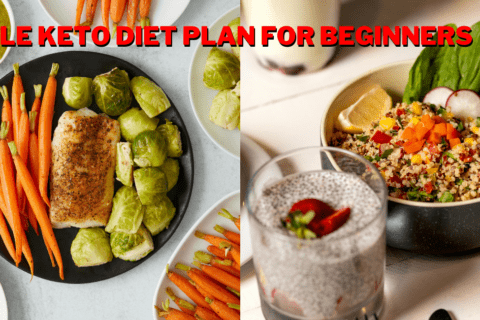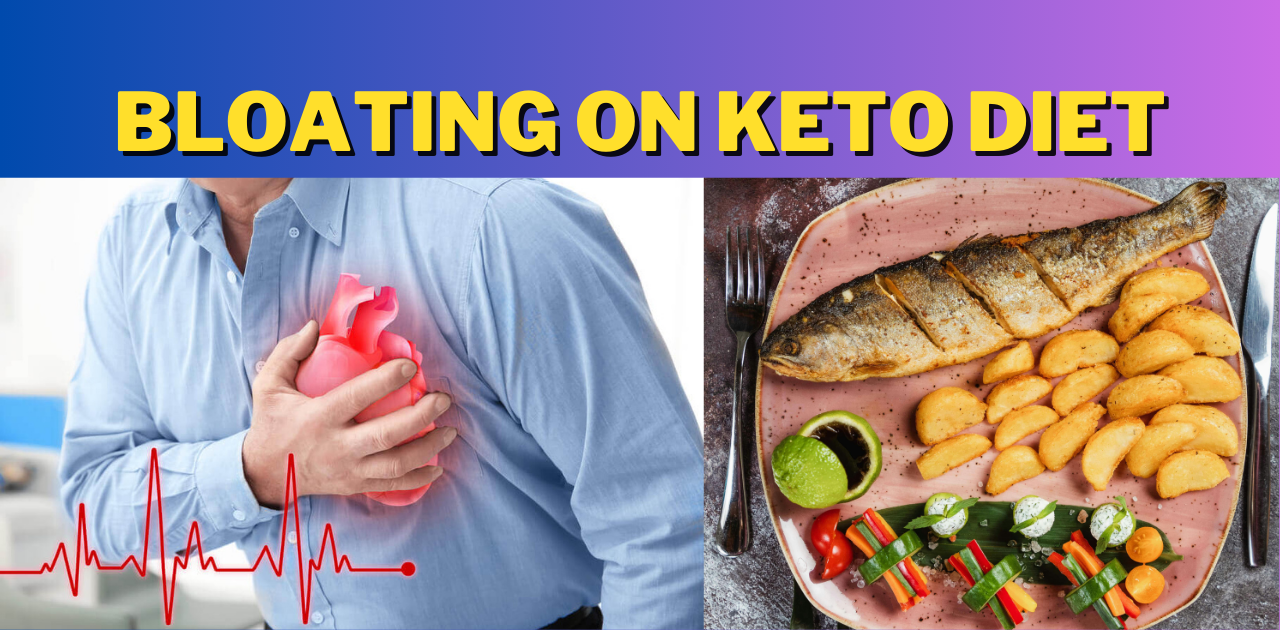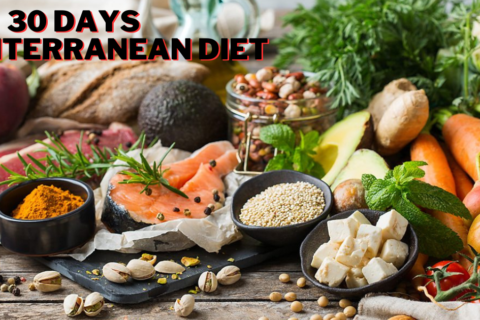Struggling with bloating on Keto Diet? Discover how to reduce and prevent bloating on the keto diet with practical tips, insights into digestive health, and keto-friendly meal suggestions designed to ease discomfort.
Bloating on keto diet involves several key factors
- Body’s Adaptation: The sudden shift from carbohydrates to fats can initially lead to digestive discomfort as the gut microbiome adjusts.
- Increased Dietary Fats: The rise in dietary fats, particularly from dairy and processed foods, may cause bloating for those who are lactose intolerant or sensitive to certain ingredients.
- Reduction in Fiber: The decrease in fiber-rich foods like whole grains and certain fruits can slow down digestion, leading to constipation and bloating.
- Electrolyte Imbalance: The keto diet often leads to water and electrolyte imbalances, which can further contribute to bloating as the body retains fluid in response to these changes.
- Keto Flu: During the initial phase of the keto diet, some individuals experience “keto flu,” which can include bloating as the body adjusts to burning fat for fuel instead of carbohydrates.
- Food Sensitivities: Common keto foods like nuts, seeds, and certain vegetables can trigger bloating if someone has a sensitivity to them.
Common Causes of Bloating on Keto Diet
- Increased Fat Intake: As the diet emphasizes high-fat consumption, the body might struggle to digest large amounts of fat, especially if it’s coming from dairy products. Those with lactose intolerance may experience significant bloating.
- Low Fiber Intake: The keto diet often limits high-fiber foods like whole grains and fruits, which are crucial for smooth digestion. This reduction can slow down bowel movements, leading to constipation and the sensation of bloating.
- Electrolyte Imbalance: The keto diet prompts the body to shed water and electrolytes rapidly, particularly during the initial phase. This loss can lead the body to retain fluids to compensate, resulting in a bloated feeling.
- Keto Flu: As the body transitions from burning carbohydrates to fats for energy, some individuals experience what’s known as “keto flu.” This phase can bring about various symptoms, including bloating, as the digestive system adjusts.
- Processed Keto Foods: Many keto-friendly processed foods contain sugar alcohols or artificial sweeteners, which are known to cause gas and bloating, particularly in those with sensitive digestive systems.
- Food Sensitivities: Common keto staples like nuts, seeds, and low-carb vegetables (e.g., cauliflower) can cause bloating in individuals with sensitivities or allergies to these foods.
- Overconsumption of Certain Vegetables: Vegetables like broccoli, Brussels sprouts, and cabbage, while low in carbs, can produce gas during digestion, leading to bloating.
Tips to Reduce Bloating on Keto Diet:
- Gradually Increase Fat Intake: When starting the keto diet, gradually increase your fat intake rather than making abrupt changes. This allows your digestive system to adjust to the higher fat levels inherent in the keto diet, reducing the likelihood of digestive distress and bloating.
- Monitor Dairy Intake on Keto: Dairy products are a common fat source on the keto diet, but they can also cause bloating, especially if you are lactose intolerant. To mitigate this, reduce dairy consumption or opt for lactose-free or plant-based alternatives suitable for the keto diet, such as almond or coconut milk.
- Increase Fiber Gradually on Keto: Although the keto diet is low in carbs, incorporating some fiber is crucial for digestion. Gradually introduce keto-friendly fiber sources, such as leafy greens, chia seeds, and flaxseeds, into your meals. This can help prevent constipation and ease bloating by promoting regular bowel movements while adhering to the keto diet.
- Stay Hydrated on the Keto Diet: Proper hydration is essential on the keto diet. Drinking plenty of water helps flush out excess sodium and reduce fluid retention, which can contribute to bloating. Aim to drink at least 8 cups of water daily, and adjust based on your activity level and individual needs while following the keto diet.
- Balance Electrolytes on Keto: The keto diet can lead to increased excretion of electrolytes, potentially causing imbalances that contribute to bloating. Ensure you get enough sodium, potassium, and magnesium by incorporating keto-friendly foods like avocados, spinach, and nuts, or consider supplements if necessary.
- Eat Smaller, Frequent Meals on Keto: Instead of consuming large meals, opt for smaller, more frequent meals throughout the day. This can help prevent the digestive system from becoming overwhelmed and reduce the risk of bloating on the keto diet.
- Limit Sugar Alcohols and Artificial Sweeteners on Keto: Many keto-friendly processed foods contain sugar alcohols and artificial sweeteners, which can cause gas and bloating. Pay attention to ingredient labels and minimize consumption of these additives to reduce bloating on the keto diet.
- Identify Food Sensitivities on Keto: Some keto-friendly foods, such as nuts, seeds, and cruciferous vegetables (like broccoli and cauliflower), can cause bloating if you have sensitivities. Keep a food diary to track your reactions and adjust your keto diet accordingly to avoid foods that trigger bloating.
- Chew Thoroughly on the Keto Diet: Properly chewing your food aids digestion and helps break down food particles, which can reduce gas and bloating. Take your time to chew each bite thoroughly while following the keto diet.
- Incorporate Probiotics on Keto: Adding probiotic-rich foods, like sauerkraut, kimchi, or keto-friendly yogurt (if dairy-tolerant), can support a healthy gut microbiome. A balanced gut flora can improve digestion and may help alleviate bloating on keto diet.
Simple Keto Friendly Meals to Prevent bloating on keto diet:
- Avocado and Egg Salad: Combine mashed avocado with hard-boiled eggs, a bit of olive oil, and seasoning. This meal is high in healthy fats and low in carbs, making it ideal for the keto diet and gentle on your stomach.
- Zucchini Noodles with Pesto: Use a spiralizer to make zucchini noodles and toss them with homemade pesto made from basil, olive oil, and nuts. This meal provides fiber and fats without the bloating potential of high-carb pastas.
- Grilled Chicken with Spinach: Grill or bake chicken breast and serve it over a bed of fresh spinach. Spinach is a low-carb vegetable that can aid digestion, and chicken provides lean protein without causing bloating.
- Salmon and Asparagus: Bake or grill a salmon fillet and pair it with steamed or roasted asparagus. Both salmon and asparagus are keto-friendly and tend to be easier on the digestive system.
- Egg Muffins: Prepare egg muffins by whisking eggs with spinach, cheese, and a bit of bacon or sausage, then bake them in a muffin tin. These are portable, easy to digest, and aligned with keto diet principles.
- Greek Yogurt with Chia Seeds: Use unsweetened Greek yogurt and mix in chia seeds. Greek yogurt (if tolerated) and chia seeds are low in carbs and high in fiber, which can aid in digestion and prevent bloating.
- Cucumber and Turkey Roll-Ups: Spread a thin layer of cream cheese on slices of turkey breast and roll them up with a slice of cucumber. This simple, no-cook meal is both keto-friendly and easy on the digestive system.
When to See a Doctor
- Severe or Persistent Symptoms: If bloating is intense, persistent, or accompanied by significant abdominal pain that does not improve with dietary adjustments, it’s important to seek medical advice.
- Accompanying Symptoms: If bloating is accompanied by alarming symptoms such as unexplained weight loss, blood in stool or vomit, or persistent nausea and vomiting, consult a healthcare professional promptly.
- Changes in Bowel Habits or No Improvement: If you experience chronic changes in bowel habits like constipation or diarrhea along with bloating, or if symptoms persist despite dietary changes, it may be necessary to see a doctor to rule out underlying health issues.
Conclusion:
Bloating on keto diet is a common but manageable challenge. By understanding the causes and following these tips, you can reduce and prevent “keto bloat” while enjoying the benefits of the ketogenic lifestyle. Stick with it, and your body will adapt, making the “bloating keto diet” a thing of the past.
If You Want To Lose Weight Visit WeightAlive
30 Day Delicious Mediterranean Diet Plan
What is the Mediterranean Diet? The Mediterranean diet is a time-tested way of eating that…
August 27, 2024 1 Comment

Keto Women
Keto Diet for Women Over 50: Secrets to Healthy Aging
Keto Diet for Women Over 50: Secrets to Healthy Aging Aging is a natural part…
August 8, 2024 1 Comment

Keto Beginners
Simple keto diet plan for beginners
The Simple keto diet plan for beginners, or keto, is a low-carb, high-fat diet that…
August 2, 2024 1 Comment


